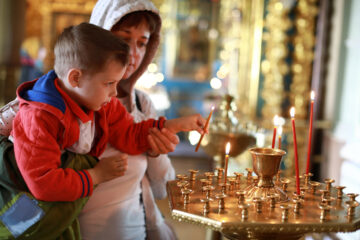Saint Justin Popovich
Who is Jesus Christ, who is both God and human? What in him is God and what is human? How do we recognize the God in him and the human? What did God grant us in the person of Jesus? All of this is revealed to us by the Holy Spirit, the ‘Spirit of Truth’. In other words, he reveals the truth about Jesus, about the God in him and the human being and about what he bestowed upon us. And this infinitely surpasses what our eyes have seen, our ears have heard and our hearts have ever felt.
Through his incarnate life on earth, Jesus established his theanthropic body, the Church, and, through this, prepares the world for the advent, the life and the activity of the Holy Spirit in the body of the Church, as the soul of this body.
On the day of Pentecost, the Holy Spirit descended from heaven onto the theanthropic body of the Church and has always remained within it as the life-giving soul of this body. This visible theanthropic body of the Church was constituted by the Holy Apostles with their belief in Jesus Christ as the savior of the world and as perfect God and perfect human being. The descent of the Holy Spirit and all his activity in the theanthropic body of the Church comes from Jesus and because of Jesus.
Everything in the divine and human providence of our salvation has come from the divine and human person of our Lord, Jesus Christ. In the end, everything can be summed up and exists in terms of his theanthropicity, even the activity of the Holy Spirit. All the dynamism of the Spirit in the world is inseparable from the theanthropic prowess of our Lord Jesus Christ in his salvation of the world. Pentecost, with all the eternal blessings of the Triune Divinity and of the Holy Spirit himself, defines the Church of the Holy Apostles, that is the Church of the Holy Apostolic faith, of the Holy Apostolic tradition, of the Holy Apostolic succession and everything Apostolic which is theanthropic.
The holy day of the Spirit which dawned at Pentecost continues without interruption in the Orthodox Church, with the untold fulness of the divine gifts and life-giving powers. Everything in the Church exists in the Holy Spirit, from the most minute to the most stupendous. When a priest censes in church and asks our Lord Jesus Christ to send down the grace of the Holy Spirit and when the inexpressible miracle of Pentecost is repeated at the consecration of a bishop, on whom is bestowed the fulness of grace, these are obvious testimonies to the fact that the Holy Spirit comprises the whole of the life of the Church.
There can be no doubt that our Lord Jesus Christ is with the Holy Spirit in the Church and that the Church is with the Holy Spirit in the Lord Jesus Christ. The Lord is the head and the body of the Church and the Holy Spirit is its soul. From the very beginning of the theanthropic dispensation of our salvation, the Holy Spirit has been linked to the foundation of the Church, that is with the foundation of the body of Christ, ‘who created the incarnation of the Word’.
In reality, every holy sacrament and all the divine virtues are a ‘Holyspirituality’. Through these the Holy Spirit comes to us and into us. He comes in substance, which means truly and actually, with all the might of his divine energies. He’s the riches of the divinity. He’s the full complement of grace. He’s the grace and life of every being. He’s the eternal and Testamental Gospel. Our Lord dwells within us with the Holy Spirit and we in him. This in itself is evidence of the presence of the Holy Spirit in us. Together with the Holy Spirit, we live in Christ and he in us. Indeed, we know this ‘from the Spirit I gave you’ (1 Jn. 3, 24).
Saint Basil the Great was inducted by the cherubim into the theanthropic mystery of the Church and proclaimed the most veritable and joyous message: ‘The Holy Spirit is the architect of the Church of God’.
Source: pemptousia.com




0 Comments